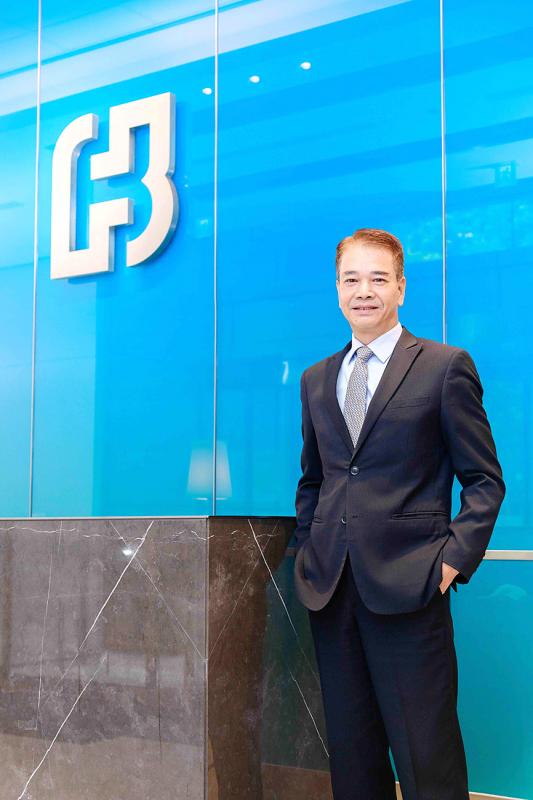Fubon Securities Investment Services Co (富邦投顧) sees the combined profit of all local publicly traded firms rising 30 percent year-on-year to NT$3.3 trillion (US$117.9 billion) this year, laying a foundation for the TAIEX to advance, Fubon Securities Investment Services chairman Charles Hsiao (蕭乾祥) said in a videoconference yesterday.
The company has an upbeat outlook on local companies on the back of the nation’s strong export orders, which hit a record high of US$256.1 billion in the first five months of the year, as well as their robust profit growth in the first quarter, Hsiao said.
The firm expects the average forward price-to-earnings (PE) ratio of local listed shares to be 14 to 17, and the TAIEX to be in the 15,000 to 18,600 points range by the end of this year, he said.

Photo courtesy of Fubon Financial Holding Co
Unlike trailing PE ratio, the ratio of a company’s current share price to its past earnings per share, forward PE ratio uses a company’s estimated future earnings and indicates whether a share is worth buying.
However, given that the TAIEX is at a comparatively high level and foreign institutional investors have been net sellers of local stocks in the past two months, it is likely that volatility would increase in the second half of the year, he added.
Hsiao recommended that investors hedge against that volatility in four sectors — chipmakers; suppliers of high-speed communications equipment; green energy, and sports and leisure, such as sports equipment and apparel makers.
In related news, the net foreign fund outflow totaled US$1.91 billion last month, the highest in a single month this year, Financial Supervisory Commission data showed.
The outflows could be attributed to foreign investors selling a net NT$51.03 billion of local shares last month, Taiwan Stock Exchange data showed.
In the first six months of the year, foreign institutional investors sold a net NT$382.7 billion of local shares.
That breaks down into a net sale of NT$384.7 billion of shares listed on the Taiwan Stock Exchange and a net purchase of NT$2 billion of shares listed on the Taipei Exchange, commission data showed.
However, Taiwan posted a net foreign fund inflow of US$10.91 billion in the first half of this year.

SEEKING CLARITY: Washington should not adopt measures that create uncertainties for ‘existing semiconductor investments,’ TSMC said referring to its US$165 billion in the US Taiwan Semiconductor Manufacturing Co (TSMC, 台積電) told the US that any future tariffs on Taiwanese semiconductors could reduce demand for chips and derail its pledge to increase its investment in Arizona. “New import restrictions could jeopardize current US leadership in the competitive technology industry and create uncertainties for many committed semiconductor capital projects in the US, including TSMC Arizona’s significant investment plan in Phoenix,” the chipmaker wrote in a letter to the US Department of Commerce. TSMC issued the warning in response to a solicitation for comments by the department on a possible tariff on semiconductor imports by US President Donald Trump’s

‘FAILED EXPORT CONTROLS’: Jensen Huang said that Washington should maximize the speed of AI diffusion, because not doing so would give competitors an advantage Nvidia Corp cofounder and chief executive officer Jensen Huang (黃仁勳) yesterday criticized the US government’s restrictions on exports of artificial intelligence (AI) chips to China, saying that the policy was a failure and would only spur China to accelerate AI development. The export controls gave China the spirit, motivation and government support to accelerate AI development, Huang told reporters at the Computex trade show in Taipei. The competition in China is already intense, given its strong software capabilities, extensive technology ecosystems and work efficiency, he said. “All in all, the export controls were a failure. The facts would suggest it,” he said. “The US

The government has launched a three-pronged strategy to attract local and international talent, aiming to position Taiwan as a new global hub following Nvidia Corp’s announcement that it has chosen Taipei as the site of its Taiwan headquarters. Nvidia cofounder and CEO Jensen Huang (黃仁勳) on Monday last week announced during his keynote speech at the Computex trade show in Taipei that the Nvidia Constellation, the company’s planned Taiwan headquarters, would be located in the Beitou-Shilin Technology Park (北投士林科技園區) in Taipei. Huang’s decision to establish a base in Taiwan is “primarily due to Taiwan’s talent pool and its strength in the semiconductor

French President Emmanuel Macron has expressed gratitude to Hon Hai Precision Industry Co (鴻海精密) for its plan to invest approximately 250 million euros (US$278 million) in a joint venture in France focused on the semiconductor and space industries. On his official X account on Tuesday, Macron thanked Hon Hai, also known globally as Foxconn Technology Group (富士康科技集團), for its investment projects announced at Choose France, a flagship economic summit held on Monday to attract foreign investment. In the post, Macron included a GIF displaying the national flag of the Republic of China (Taiwan), as he did for other foreign investors, including China-based